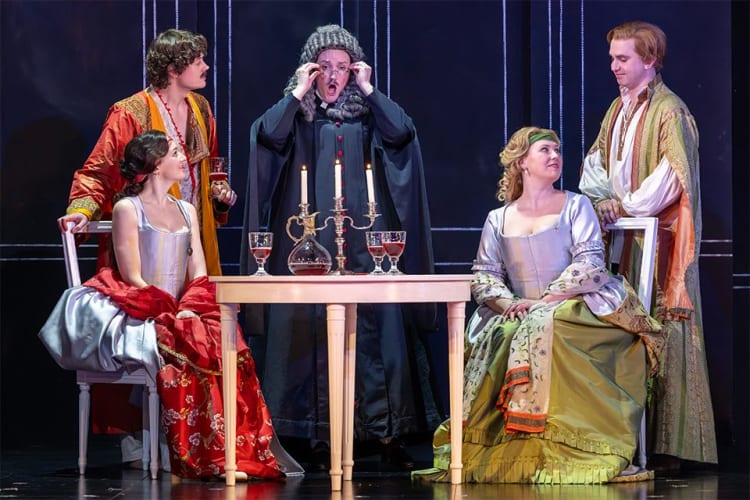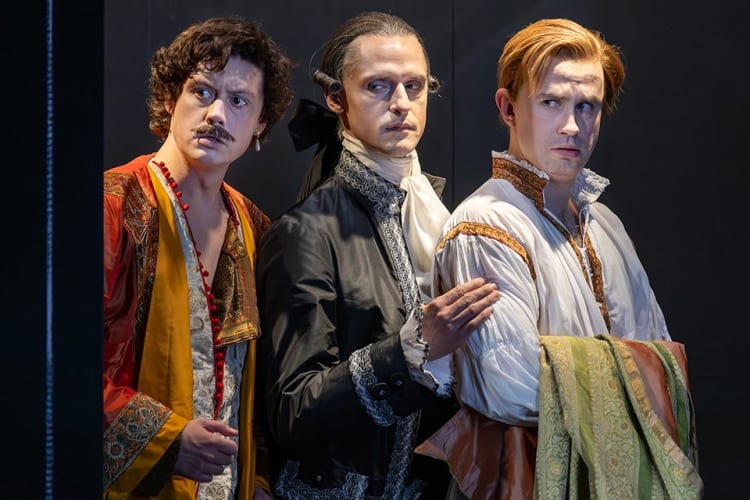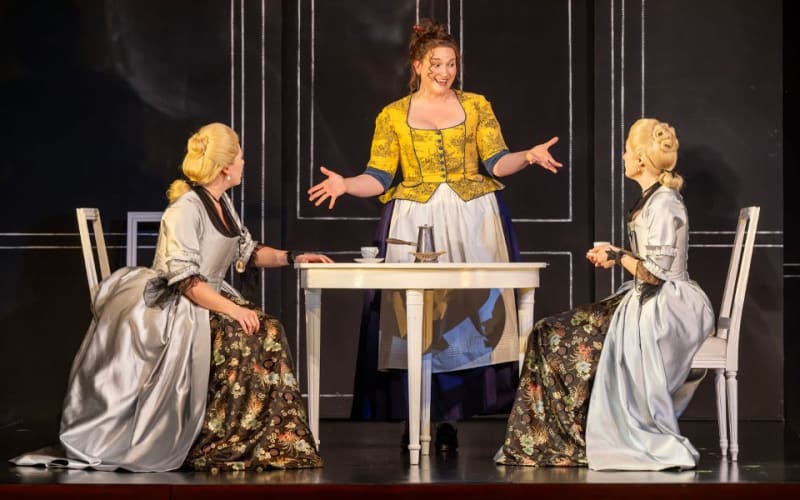This year marks the 20th anniversary of Tim Albery’s striking production of Cosi fan tutte, in which a philosophical experiment—one involving the romantic attachments of four young people—is conducted within the confines of a large camera obscura.
I last saw Albery’s staging of Cosi fan tutte at the Leeds Grand Theatre in 2016, and it remains an impeccable piece of work, both emotionally rich and intellectually engaging. I can appreciate why Mozart’s opera has been overshadowed by the more popular Marriage of Figaro, which combines a delightfully convoluted plot with a colourful range of characters, but the pared-down nature of Cosi fan tutte (six characters, one location) is crucial to its overall impact.
Convinced that romantic love is an illusion and that women are inherently untrustworthy, the philosopher Don Alfonso (Quirijn de Lang) wagers his two young friends—Ferrando (Anthony Gregory) and Guglielmo (Henry Neill)—that their respective sweethearts—the sisters Dorabella (Heather Lowe) and Fiordiligi (Alexandra Lowe)—will not remain constant if their fidelity is put to the test.
To test this theory, the two young men are hastily dispatched to fight in a fictitious war, leaving the two women inconsolable—much to the amused bafflement of their world-weary maid, Despina (Gillene Butterfield). When the men return, they do so in the garb of two mysterious foreign suitors, and set about seducing each other’s lovers in order to reveal the true depth of their affections.
Despite having seen Albery’s production before, I was far more struck on this occasion by the opera’s ambiguous stance on human love. The scientific nature of Don Alfonso’s experiment is, of course, cleverly underlined by Tobias Hoheisel’s camera obscura set, with its flap-like doors allowing specimens in and out. The interchangeability of the four young lovers, particularly during the early part of the production, is further emphasised by having them wear identical 18th-century costumes.
Many scholars have commented on the sourness of the opera’s ending, which sees the four young people married to their original partner despite having fallen in love—albeit briefly—with someone else. The ambiguity of the finale has prompted Germaine Greer to describe Cosi fan tutte as a "comitragedy", while Jan Swatford argues that it presents "as jaundiced a portrayal of love as was ever seen on the stage". What David Cairns refers to as the "deliberate incompleteness" of the opera is underlined by the final image of this production, which frames the four young lovers as frozen by competing forces and unsure what to do next.
Quirijn de Lang has proven himself on numerous occasions to be a talented comedic performer, and he brings a delightful air of mischief to the role of Don Alfonso. Gillene Butterfield is equally impressive as his co-conspirator Despina, her excellent comic timing and earthy cynicism providing a much-needed counterpoint to the earnest high emotion of her distraught mistresses.
Heather and Alexandra Lowe (who are not sisters in real life!) are both terrific as Dorabella and Fiordiligi. Having seen Heather Lowe in a number of trouser roles—most memorably as Cherubino in Figaro—it was an enjoyable change of pace to watch her play a woman swept away by passion. Making her Opera North debut, Alexandra Lowe brings purity and radiance to the role of Fiordiligi, the sister who struggles longest with her desires.
Anthony Gregory and Henry Neill are equally engaging as the two seducers who find their illusions shattered when their assault on the two sisters proves to be successful. Indeed, both performers do a fabulous job of mixing braggadocio with wounded male pride.
The score of Così fan tutte may be less familiar than those of Mozart’s other operas—with the exception of the sublime “Soave sia il vento”—but, nevertheless, contains some of his most beguiling music, all of which is beautifully performed by the Orchestra of Opera North.


